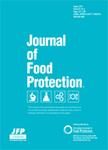版权所有:内蒙古大学图书馆 技术提供:维普资讯• 智图
内蒙古自治区呼和浩特市赛罕区大学西街235号 邮编: 010021

作者机构:Univ Lleida Ctr UdL Postharvest Unit Inst Agro Food Res & TechnolIRTA E-25198 Lleida Spain Univ Bologna CRIOF DIPROVAL I-40057 Cadriano Bologna Italy Ctifl Ctr Prigonrieux F-24130 Prigonrieux France
出 版 物:《JOURNAL OF FOOD PROTECTION》 (食品保护杂志)
年 卷 期:2006年第69卷第11期
页 面:2703-2711页
核心收录:
学科分类:0832[工学-食品科学与工程(可授工学、农学学位)] 08[工学] 0836[工学-生物工程]
主 题:Mediterranean region Candida sake storage period Penicillium expansum Population dynamics Trials experimentation postharvest decay pome fruit
摘 要:The effectiveness of a formulated product of the yeast Candida sake CPA-1 for controlling postharvest diseases on pome fruits was demonstrated in laboratory, semicommercial, and commercial trials carried out in the major pome fruit producing region of the European Union. First, one wettable powder and seven liquid formulations were tested in laboratory trials that involved two varieties of apples and two varieties of pears. In all cases, an efficacy similar to that of fresh cells was demonstrated in the control of artificial Penicillium expansum infection. After these trials, the formulated product chosen for semicommercial and commercial trials was LF1, a liquid formulation that is particularly suitable for commercial applications. In semicommercial trials, LF1 showed a performance similar to fresh cells in most trials, and the population dynamics of both fresh and formulated cells were quite stable throughout the storage period. This indicates the high viability of C. sake CPA1 in this formulation and the absence of adverse effects during the formulation of the product, which may significantly affect both its ability to grow on fruit and its antagonistic activity. We evaluated the control of natural infection after applying the formulated product in a commercial drencher in different packinghouses. A significant reduction in the incidence of diseases was observed with a recommended dose of around 10(7) CFU/ml when natural infections were greater than 1%. In general, large quantities of yeast were observed on the surface of unwounded fruits of different pome fruit cultivars. Moreover, populations of this biocontrol agent increased rapidly on fruit surfaces and remained quite stable for a long time under commercial storage conditions. Commercial practices used in packinghouses were therefore successfully applied for this formulated product.